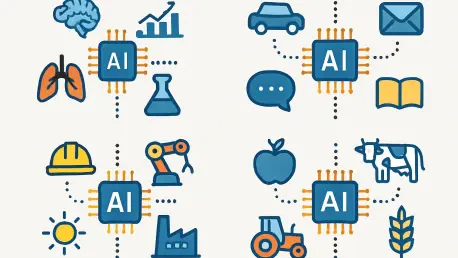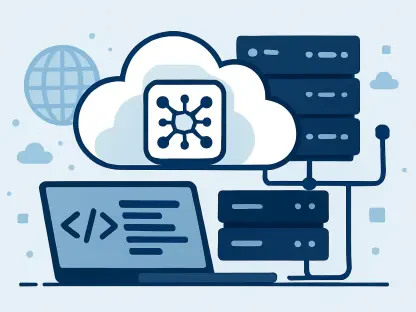In an era where artificial intelligence is becoming the backbone of enterprise innovation, a seismic shift is occurring within the realm of large language models (LLMs) that could redefine how industries operate. Once hailed for their ability to tackle a vast array of tasks with remarkable versatility, general-purpose AI models are now facing scrutiny for their shortcomings in specialized contexts. A new trend—domain specialization—is emerging as a powerful solution, tailoring AI to meet the unique demands of sectors like healthcare, finance, and legal services. This pivot towards customized models isn’t merely an incremental change; it represents a fundamental evolution in how technology can deliver precision and value. As businesses grapple with increasingly complex challenges, the push for AI that understands industry-specific nuances is gaining momentum. This article delves into the rise of domain-specific models, exploring their potential to transform operations, the hurdles in their development, and their varied impact across different fields, ultimately revealing why this trend is poised to shape the trajectory of AI advancements.
Unmasking the Shortfalls of Broad AI Systems
The meteoric rise of general-purpose LLMs, fueled by breakthroughs in generative AI, has undeniably transformed automation across countless sectors by handling diverse tasks with impressive adaptability. These models have powered everything from customer service chatbots to content generation, proving their worth as multi-talented tools. Yet, their broad scope often becomes a liability when precision is paramount. In industries where deep, contextual knowledge is essential, such as medical diagnostics or legal interpretation, these systems frequently fail to deliver the nuanced insights required. The analogy of a skilled generalist struggling to match a specialist’s expertise rings true here. Businesses are increasingly recognizing that while these models excel in versatility, they lack the depth to address intricate, sector-specific problems, creating a critical gap that demands a more focused approach to AI development.
This limitation has profound implications for enterprise IT operations, where the stakes for accuracy are often sky-high. Consider a scenario in a financial institution where a general-purpose model misinterprets regulatory compliance language due to a lack of specialized training. Such errors can lead to costly mistakes or missed opportunities, underscoring the inadequacy of one-size-fits-all solutions in high-stakes environments. The growing frustration with these shortcomings has sparked a reevaluation of how AI can be better aligned with specific needs. As industries strive for efficiency and reliability, the realization that broad models cannot fully meet the demands of niche applications is driving interest in more tailored technologies. This shift marks a turning point, highlighting the urgent need for AI systems that can move beyond surface-level understanding to provide expert-level insights in targeted domains.
Emergence of Tailored AI for Industry Needs
In response to the gaps left by general-purpose models, domain-specific LLMs are stepping into the spotlight as precision instruments crafted for particular industries. Unlike their broader counterparts, these models are trained on datasets rich with industry-specific terminology, logic, and real-world scenarios, enabling them to deliver outputs with a level of accuracy and relevance previously unattainable. In healthcare, for instance, specialized AI can assist in analyzing complex medical literature or supporting diagnostic decisions with uncanny precision. Similarly, in the legal field, these tools excel at dissecting case law or contracts with an expert’s eye. This ability to emulate human-like understanding within a narrow focus is proving revolutionary, offering businesses a way to tackle challenges that generic systems simply cannot address effectively.
The allure of domain-specific models lies in their capacity to transform raw data into actionable, context-aware insights tailored to unique operational demands. For companies operating in highly regulated or technical sectors, this means fewer errors, faster decision-making, and a stronger grasp of intricate details that might otherwise be overlooked. Take the example of a pharmaceutical firm leveraging a specialized model to sift through vast research data for drug development—such a tool can pinpoint relevant findings far more efficiently than a general model lacking deep domain knowledge. This targeted approach not only boosts productivity but also builds trust in AI outputs, as results are grounded in a thorough understanding of the field. As more organizations witness these benefits, the adoption of specialized AI is accelerating, signaling a broader shift towards customization as a cornerstone of technological advancement.
Transforming Business Through Customized Solutions
The adoption of domain-specific LLMs is reshaping the business landscape by providing tools that address unique challenges with unparalleled precision. Companies that integrate these models into their workflows are not merely keeping pace with competitors; they are often surging ahead by solving problems that generic AI cannot touch. In sectors where every decision carries significant weight, such as healthcare or finance, the ability to rely on AI that understands the intricacies of the field translates to sharper strategies and better outcomes. This competitive edge is becoming a defining factor for market leaders, as tailored solutions enable more effective resource allocation, risk management, and customer engagement, fundamentally altering how operations are conducted.
Beyond operational efficiency, the strategic value of specialized AI lies in its potential to unlock innovation tailored to a company’s specific goals. Businesses are finding that these models can uncover insights or automate processes in ways that were previously unimaginable, fostering a culture of forward-thinking problem-solving. For instance, a legal firm using a domain-specific tool to predict case outcomes based on historical data gains not just efficiency but also a reputational boost for accuracy. This ripple effect extends across departments, enhancing overall performance and positioning early adopters as pioneers in their respective fields. As more enterprises recognize the transformative power of customization, the race to integrate specialized AI is intensifying, underscoring its role as a catalyst for sustained growth and market dominance.
Navigating the Obstacles of Specialization
Creating domain-specific LLMs is no small feat, as the path to development is fraught with significant financial and technical barriers. The investment required can be staggering, often running into millions of dollars for a single model, due to the need for extensive, high-quality datasets and specialized expertise. Beyond the monetary cost, technical challenges loom large—ensuring that models produce factually accurate outputs and possess a semblance of common-sense reasoning remains a persistent hurdle. These issues can undermine the reliability of AI in critical applications, where even minor inaccuracies can have major consequences. Nevertheless, the industry is actively pursuing solutions through enhanced data integration and real-time validation mechanisms to bolster trust in these systems.
Despite these challenges, the commitment to overcoming them reflects the high stakes of domain specialization in AI. Research efforts are increasingly focused on refining how models interpret context and verify information, aiming to eliminate errors that stem from a lack of real-world understanding. For example, integrating broader knowledge bases helps address gaps in reasoning, while advanced algorithms work to cross-check outputs against trusted sources. The progress in these areas, though incremental, signals a future where specialized models can operate with greater autonomy and precision. As development costs gradually decrease and technical expertise becomes more widespread, the barriers to entry are expected to lower, allowing a broader range of organizations to harness the power of tailored AI without prohibitive upfront investments.
Industry-Specific Outcomes and Variability
The effectiveness of domain-specific LLMs is not uniform across all sectors, revealing a complex landscape of successes and surprises. In healthcare, models like BioGPT have demonstrated remarkable prowess by aiding in biomedical research and diagnostics, delivering insights that rival human experts. Similarly, in legal services, tools such as Predictice have enhanced the analysis of legal precedents, streamlining workflows with impressive accuracy. These achievements highlight how specialization can revolutionize fields where deep expertise is non-negotiable, offering a glimpse into a future where AI becomes an indispensable partner in tackling intricate challenges. The tangible benefits in these areas are driving enthusiasm for further investment and innovation.
Contrastingly, the finance sector presents a more nuanced picture, where outcomes are less predictable and occasionally counterintuitive. While specialized models like BloombergGPT were expected to dominate due to their tailored training, general-purpose systems like GPT-4 have sometimes outperformed them in specific tasks, such as interpreting complex market trends. This variability suggests that specialization does not guarantee superiority in every context and underscores the importance of aligning AI deployment with the unique dynamics of each industry. Businesses must approach adoption with a strategic mindset, carefully evaluating where specialized tools offer true value versus where broader models might suffice. This mixed track record serves as a reminder that the journey towards effective domain-specific AI requires adaptability and a willingness to learn from diverse industry experiences.
Balancing General and Niche AI for Competitive Edge
The AI market is undergoing a notable bifurcation, splitting into two complementary tracks: general-purpose models suited for wide-ranging applications and domain-specific models built for mission-critical precision. Forward-thinking organizations are capitalizing on this duality by deploying both types of systems in tandem—using versatile tools for flexibility in everyday tasks and specialized ones for high-stakes functions where accuracy is paramount. This balanced approach allows companies to maximize efficiency while minimizing risks, ensuring that they are well-equipped to handle both routine operations and complex challenges. The synergy between these two paths is becoming a hallmark of strategic AI adoption in competitive landscapes.
Adding another layer to this strategy, many enterprises are investing in proprietary LLMs that embed their unique intellectual property, securing a distinct advantage over rivals. While initially a tactic reserved for well-resourced giants, this trend is poised to expand as computational resources and technical know-how become more accessible over the coming years. Smaller players are expected to join the fray, leveling the playing field and fostering a wave of innovation across industries. This democratization of specialized AI signals a future where differentiation through tailored technology is not just an option but a necessity. Companies that acted early to blend general and niche models while pursuing proprietary solutions have already positioned themselves as leaders, setting a precedent for others to follow in navigating this evolving terrain.
Paving the Way for an AI-Driven Tomorrow
Reflecting on the journey of domain specialization, it’s clear that this movement tackled critical gaps in AI by delivering precision where general-purpose models fell short. Industries witnessed transformative changes as tailored solutions reshaped healthcare diagnostics and legal analysis, though finance revealed the unpredictability of outcomes. The steep costs and technical hurdles of development were met with persistent innovation, laying groundwork for more reliable systems. Looking ahead, the focus should shift to accelerating accessibility, ensuring that smaller enterprises can adopt specialized models without prohibitive barriers. Strategic integration of both broad and niche AI tools must continue to be prioritized, guiding businesses towards a balanced approach that maximizes impact. As computational resources expand, fostering collaboration between tech developers and industry experts will be key to refining these models, ensuring they evolve to meet emerging needs with even greater accuracy and relevance.









